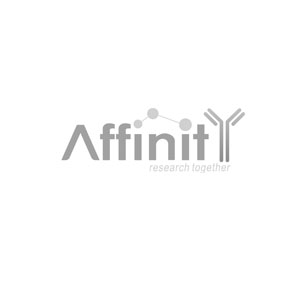ATF6B Antibody - #AF0454
| Product: | ATF6B Antibody |
| Catalog: | AF0454 |
| Description: | Rabbit polyclonal antibody to ATF6B |
| Application: | WB IF/ICC |
| Reactivity: | Human |
| Prediction: | Pig, Horse, Dog |
| Mol.Wt.: | 76kDa; 77kD(Calculated). |
| Uniprot: | Q99941 |
| RRID: | AB_2834306 |
Product Info
*The optimal dilutions should be determined by the end user.
*Tips:
WB: For western blot detection of denatured protein samples. IHC: For immunohistochemical detection of paraffin sections (IHC-p) or frozen sections (IHC-f) of tissue samples. IF/ICC: For immunofluorescence detection of cell samples. ELISA(peptide): For ELISA detection of antigenic peptide.
Cite Format: Affinity Biosciences Cat# AF0454, RRID:AB_2834306.
Fold/Unfold
Activating transcription factor 6 beta; ATF 6 beta; ATF6-beta; ATF6B; ATF6B_HUMAN; ATF6beta; cAMP response element binding protein related protein; cAMP response element-binding protein-related protein; cAMP responsive element binding protein like 1; cAMP-dependent transcription factor ATF-6 beta; cAMP-responsive element-binding protein-like 1; CREB L1; Creb related protein; CREB RP; Creb-rp; CREBL 1; CREBL1; Crebrp; Cyclic AMP dependent transcription factor ATF 6 beta; Cyclic AMP dependent transcription factor ATF6 beta; FLJ10066; G13; G13 protein; OTTHUMP00000029432; OTTHUMP00000029433; Processed cyclic AMP-dependent transcription factor ATF-6 beta; Protein G13;
Immunogens
- Q99941 ATF6B_HUMAN:
- Protein BLAST With
- NCBI/
- ExPASy/
- Uniprot
MAELMLLSEIADPTRFFTDNLLSPEDWGLQNSTLYSGLDEVAEEQTQLFRCPEQDVPFDGSSLDVGMDVSPSEPPWELLPIFPDLQVKSEPSSPCSSSSLSSESSRLSTEPSSEALGVGEVLHVKTESLAPPLCLLGDDPTSSFETVQINVIPTSDDSSDVQTKIEPVSPCSSVNSEASLLSADSSSQAFIGEEVLEVKTESLSPSGCLLWDVPAPSLGAVQISMGPSLDGSSGKALPTRKPPLQPKPVVLTTVPMPSRAVPPSTTVLLQSLVQPPPVSPVVLIQGAIRVQPEGPAPSLPRPERKSIVPAPMPGNSCPPEVDAKLLKRQQRMIKNRESACQSRRKKKEYLQGLEARLQAVLADNQQLRRENAALRRRLEALLAENSELKLGSGNRKVVCIMVFLLFIAFNFGPVSISEPPSAPISPRMNKGEPQPRRHLLGFSEQEPVQGVEPLQGSSQGPKEPQPSPTDQPSFSNLTAFPGGAKELLLRDLDQLFLSSDCRHFNRTESLRLADELSGWVQRHQRGRRKIPQRAQERQKSQPRKKSPPVKAVPIQPPGPPERDSVGQLQLYRHPDRSQPAFLDAIDRREDTFYVVSFRRDHLLLPAISHNKTSRPKMSLVMPAMAPNETLSGRGAPGDYEEMMQIECEVMDTRVIHIKTSTVPPSLRKQPSPTPGNATGGPLPVSAASQAHQASHQPLYLNHP
Predictions
Score>80(red) has high confidence and is suggested to be used for WB detection. *The prediction model is mainly based on the alignment of immunogen sequences, the results are for reference only, not as the basis of quality assurance.
High(score>80) Medium(80>score>50) Low(score<50) No confidence
PTMs - Q99941 As Substrate
| Site | PTM Type | Enzyme | Source |
|---|---|---|---|
| A2 | Acetylation | Uniprot | |
| S89 | Phosphorylation | Uniprot | |
| S93 | Phosphorylation | Uniprot | |
| S279 | Phosphorylation | Uniprot | |
| K305 | Ubiquitination | Uniprot | |
| S306 | Phosphorylation | Uniprot | |
| K324 | Ubiquitination | Uniprot | |
| S546 | Phosphorylation | Uniprot | |
| S564 | Phosphorylation | Uniprot | |
| S618 | Phosphorylation | Uniprot | |
| K668 | Ubiquitination | Uniprot |
Research Backgrounds
Transcriptional factor that acts in the unfolded protein response (UPR) pathway by activating UPR target genes induced during ER stress. Binds DNA on the 5'-CCAC[GA]-3' half of the ER stress response element (ERSE) (5'-CCAATN(9)CCAC[GA]-3') when NF-Y is bound to ERSE.
N-glycosylated.
During unfolded protein response, a fragment of approximately 60 kDa containing the cytoplasmic transcription factor domain is released by proteolysis. The cleavage is probably performed sequentially by site-1 and site-2 proteases.
Endoplasmic reticulum membrane>Single-pass type II membrane protein.
Nucleus.
Note: Under ER stress the cleaved N-terminal cytoplasmic domain translocates into the nucleus.
Ubiquitous.
Homodimer and heterodimer with ATF6-alpha. The dimer interacts with the nuclear transcription factor Y (NF-Y) trimer through direct binding to NF-Y subunit C (NF-YC).
The basic domain functions as a nuclear localization signal.
The basic leucine-zipper domain is sufficient for association with the NF-Y trimer and binding to ERSE.
Belongs to the bZIP family. ATF subfamily.
Research Fields
· Environmental Information Processing > Signal transduction > cGMP-PKG signaling pathway. (View pathway)
· Environmental Information Processing > Signal transduction > PI3K-Akt signaling pathway. (View pathway)
· Environmental Information Processing > Signal transduction > TNF signaling pathway. (View pathway)
· Genetic Information Processing > Folding, sorting and degradation > Protein processing in endoplasmic reticulum. (View pathway)
· Human Diseases > Substance dependence > Cocaine addiction.
· Human Diseases > Substance dependence > Amphetamine addiction.
· Human Diseases > Substance dependence > Alcoholism.
· Human Diseases > Infectious diseases: Viral > Hepatitis B.
· Human Diseases > Cancers: Overview > Viral carcinogenesis.
· Organismal Systems > Aging > Longevity regulating pathway. (View pathway)
· Organismal Systems > Circulatory system > Adrenergic signaling in cardiomyocytes. (View pathway)
· Organismal Systems > Nervous system > Dopaminergic synapse.
· Organismal Systems > Endocrine system > Insulin secretion. (View pathway)
· Organismal Systems > Endocrine system > Estrogen signaling pathway. (View pathway)
· Organismal Systems > Endocrine system > Thyroid hormone synthesis.
· Organismal Systems > Endocrine system > Aldosterone synthesis and secretion.
· Organismal Systems > Endocrine system > Relaxin signaling pathway.
Restrictive clause
Affinity Biosciences tests all products strictly. Citations are provided as a resource for additional applications that have not been validated by Affinity Biosciences. Please choose the appropriate format for each application and consult Materials and Methods sections for additional details about the use of any product in these publications.
For Research Use Only.
Not for use in diagnostic or therapeutic procedures. Not for resale. Not for distribution without written consent. Affinity Biosciences will not be held responsible for patent infringement or other violations that may occur with the use of our products. Affinity Biosciences, Affinity Biosciences Logo and all other trademarks are the property of Affinity Biosciences LTD.
